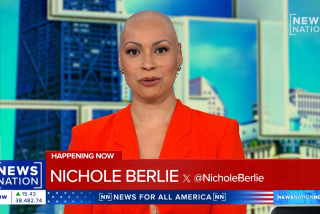Trying to Discover the Answers to Some Very Hairy Questions
- Share via
SAN DIEGO — color, abundance, and even the location of hair on our bodies changes dramatically throughout our lifetimes.
Ever wonder why?
More to the point, ever wondered if it’s worth it?
Are the emotional gymnastics that these werewolfish transformations induce--the repeated psychological traumas we might otherwise mercifully avoid--really worth all these hassles inherent in having hair? If we take a look at just what our precious human fur does to us, as opposed to for us:
Let’s start with newborn babies. Ethnic heritage not withstanding, babies just aren’t very hairy. Oh, some of them may seem to be. But a little bit of hair on a little bitty head appears deceptively thick. In truth, we begin life with hair that’s invariably fine, soft and thin--and destined to undergo a substantial number of transformations throughout its existence before once again fitting that description.
Now, admittedly, hair isn’t all that important to children except as something else that needs washing, gets things rubbed into it and gets yanked out by our siblings. But we’re soon buffeted by the stormy winds of adolescence, and suddenly a major portion of our lives is dedicated to achieving the proper quantity, quality, length, density and color of hair. That effort is compounded by the new, hormonally triggered patches of fuzz erupting at what seem random--sometimes even perverse--locations on bodies already having enough other problems as it is.
We can all count on experiencing at least some degree of psychological upheaval when we reach this stage in our development.
I personally confess to having gazed dejectedly at the sight of a month-old beard, still just slightly sparser than the grass that sprouts up through the cracks of an abandoned parking lot--and about as healthy-looking. And I’m certain I had a sexual opposite somewhere, equally despondent over junior high shower-room comments equating her legs to those of a wooly mammoth.
But that’s just the beginning. Insult invariably accompanies injury where adolescence is concerned, and we quickly discover that body hair has a potent ally in its assault upon our social sensibilities:
Sweat.
No sooner do we find our armpits and, uh, the like sprouting hair as suddenly as a newly seeded lawn than we experience the for-the-rest-of-our-lives affliction of Body Odor.
There is, no doubt, good reason for us to have hair on (in?) parts of our body that radiate the most body heat. Yet, in warm surroundings we sweat, enabling evaporation to aid the transfer of heat to the surrounding air.
Now, fresh, clean sweat has very little odor and is hardly offensive. But the bacteria living on our skin like sweat better than mold likes a bachelor’s refrigerator, and the wastes these microbial monsters generate as they grow and multiply gives sweat socks, locker rooms and nervous teen-agers their distinctive odors. So when we give that bacteria a few hours to incubate on the humongously increased surface area of the warm, damp hair of an armpit (or wherever), the resulting B.O. can cause even the most indestructible grade of nylon or polyester to curdle.
Oh sure, we outgrow puberty--most of us, anyway--and enter the calmer years of early adulthood. Yet just as we’re getting our act together, our seemingly dormant biological clock stutters back to life.
The first shock is the first gray hair.
“It must be the lighting in here . . . “ “What did I get in my hair?” or “Oh, my God, what if (fill in a catty friend’s name) finds out!” might sound familiar. The first real hint of fleeting youth, of impending “oldness,” perhaps even of mortality--our hair takes another swipe at the hand that combs it.
And no matter how we deal with this trauma, we will, one and all, be ever more sensitive to future signs of (now reluctantly?) distancing ourselves from an adolescent period that actually wasn’t all that bad, now that we think about it.
Those future signs aren’t long in coming. Ask anyone who has awakened one morning to find that the beauty mark she went to sleep with last night has metamorphosed into a hair-sprouting mole fit for a Halloween witch. Or ask the dapper young swinger who, while checking his profile before an excruciatingly promising date, is horrified at the discovery of a hair the thickness of a licorice stick jutting out of his ear--and on his best side, of course. (“But how could it have? . . . I mean, it wasn’t there this morning . . . “ are telltale mutterings of the afflicted.)
And then there are (yuk) nose hairs. The sneakiest of the lot, they have the perverse ability to hide, tightly curled and inaccessible, well up inside an otherwise innocent nostril. But just let a social situation become critical, and they spontaneously unwind and hang down over your upper lip like a jungle vine. Naturally (you guessed it) there’s never a mirror or scissors to be had anywhere. And you know that if you summon up the courage and yank it out by the root, your contact lenses will wash away and your eyes won’t stop watering for two weeks.
It seems unconscionable that these lifelong trials are suffered because of something so superfluous as hair. In fact, it’s almost as if body hair is a curse. I’m even tempted to wonder, drawing from creationist doctrine, if perhaps there’s an omission in the book of Genesis, describing the origin of our species.
Could it be, popular paintings to the contrary, that in the beginning Adam and Eve were naked not only of clothing, but also didn’t have a hair follicle between them? Given all of the above trials and tribulations we’ve so objectively examined, wouldn’t any critical thinking person come to this inescapable conclusion: It was only after God banished the offenders from Eden that he angrily muttered after them, “Oh, yeah--and let there be hair.”


